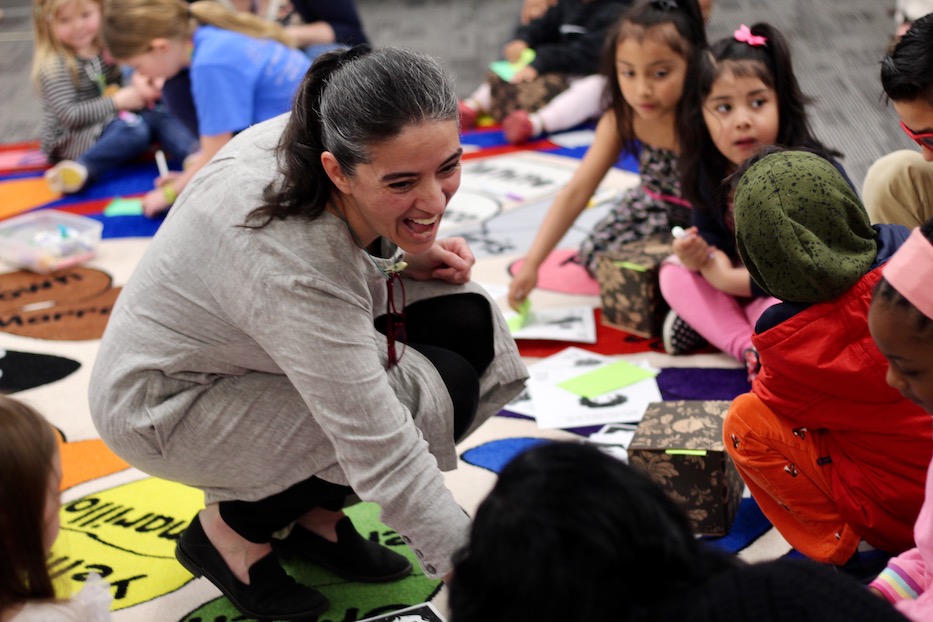
Books | Culture & Community | Education & Youth | Arts & Culture | New Haven Free Public Library | Education | Earth Day
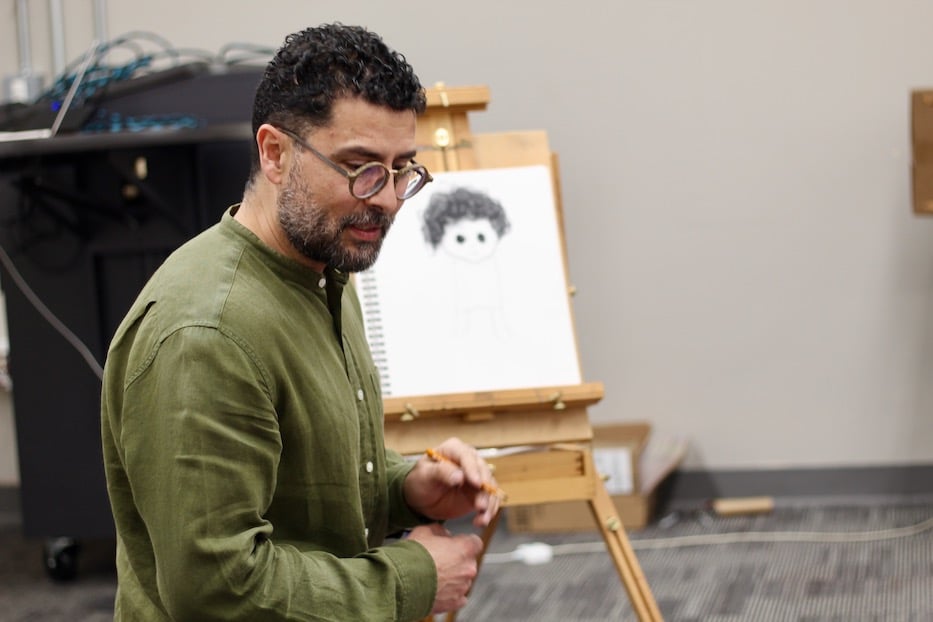
Rubén Rodríguez Ferreira. Lucy Gellman Photos.
Illustrator Rubén Rodríguez Ferreira crouched down to a pint sized easel, sketching out the loose contours of a young girl’s face. In front of him, ten pairs of tiny hands busied themselves with watercolor markers, rendering her cheeks in purple and orange. Back at the easel, he contemplated her hair, and decided that it would be fine and curly, just like his.
He drew a nest of thick curls, then another. Suddenly, his character Alma was standing in front of him, her eyes full of wonder.
Alma takes center stage in The Child and the Tree or Alma Semilla, a new children’s book from partners Rodríguez Ferreira and Nohra Bernal that is decades in the making. Saturday, the duo brought it to the Fair Haven Branch Library for an Earth Day book launch in English and Spanish.
It is an especially sacred place for Bernal, who raised her three boys in the library, and now leads a bilingual story hour there each Tuesday morning.
“We don't really own the earth,” Bernal said in an interview on WNHH Community Radio’s “Arts Respond” before the launch. “We're just here for a moment. And while we're here, we're stewards. What do we do with what we have in front of us? We have to make something out of this. Make it better, make it beautiful, make it fruitful.”
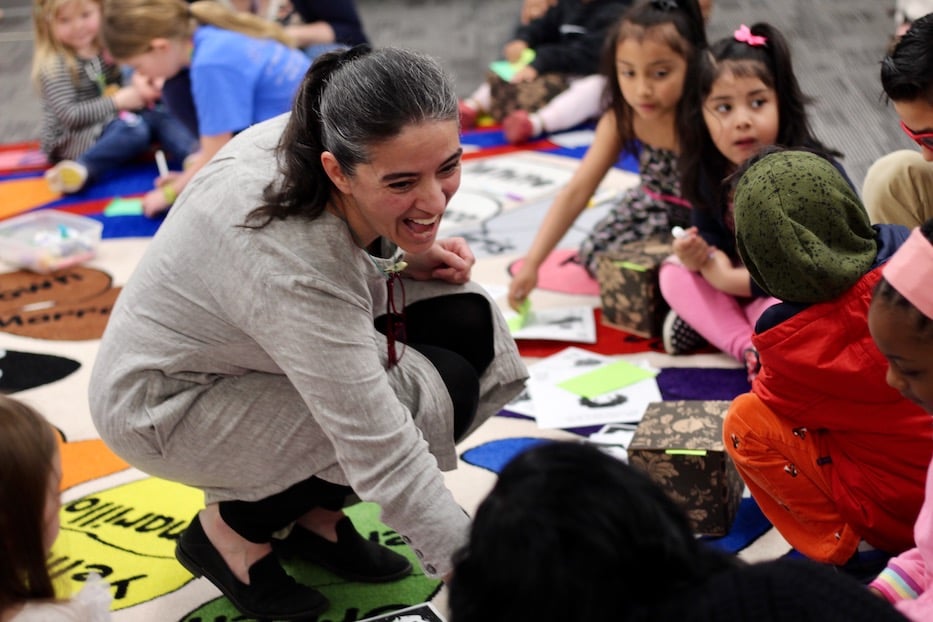
Nohra Bernal: "We have to make something out of this. Make it better, make it beautiful, make it fruitful.” Lucy Gellman Photos.
Written in honor of their family’s own migration journey, The Child and the Tree tells the story of Alma, a young, bright-eyed girl who discovers a single, small tree in the desert, and begins to visit as frequently as she can. On her visits, the two talk to each other, comparing the ways in which they are still growing. They dream and star-gaze and grow, caring for each other as they age slowly.
And then one day, there is a sandstorm that rips away the tree’s leaves and branches, leaving a knotted, gnarled trunk and single tuft of green. Alma rushes to save her arboreal friend, following its wise instruction as the leaves grow back and seed pods sprout from its branches. When the time is right, she harvests the seeds, rolling them into balls of mud and sand to plant in the desert.
Bernal said the process, a method of no-till agriculture, is a nod to centuries-long, non-Western methods of restoring farmland that she learned about while writing. In the book, Alma watches as almost two dozen seedlings sprout from her labor. When she and her family must leave for a new home, she brings seeds with her to plant when she arrives.
It is a story of environmental stewardship, migration, and reverence for nature in a warming world. It is also largely based on their own experiences coming to this country, and learning to start again. More on that below.
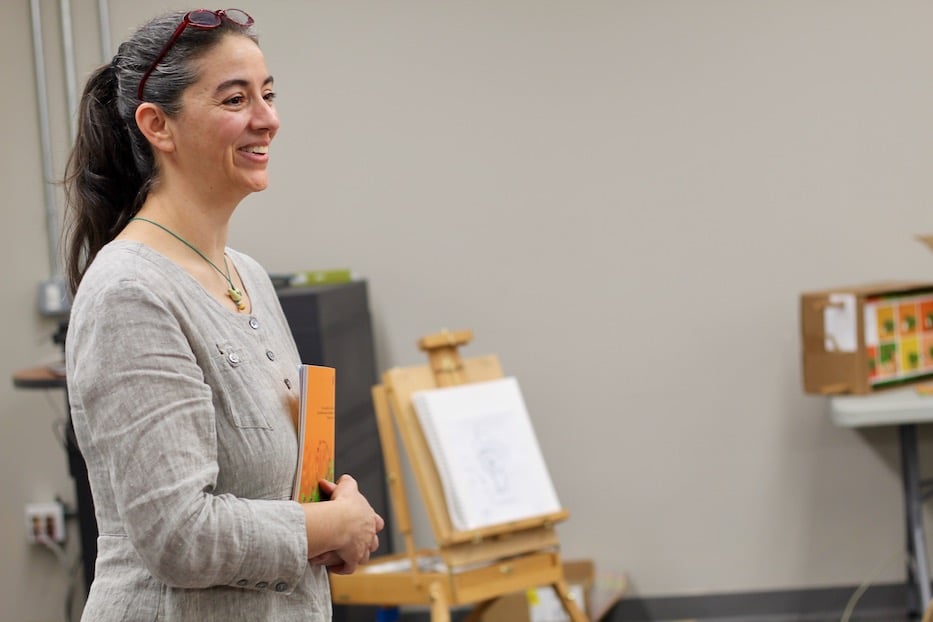
Saturday, Bernal welcomed young readers as they stepped through a door strung with green crepe paper, and took a seat on a reading rug patterned with bright shapes and numbers. On one end, brothers Dante and Milan Castillo Luna sat shoulder-to-shoulder as Bernal took a seat. On the other, siblings Conner and Emily Konkel looked up at Bernal with wide eyes, wondering what story she was about to tell.
Bernal opened the first pages to a wide-eyed, smiling Alma, alone and barefoot in the desert. Just feet away from her, Rodríguez Ferreira beamed.
“We want to read to our kids because books are fun and take us places,” Bernal said before diving into the story. “One day, you might have an idea, invisible. That can become a book. A book you can share with other people.”
As she read, Bernal stopped often to show off the way Rodríguez Ferreira had brought both Alma and the tree to life. When Alma looked through its branches, Bernal took her time looking too, as if she was seeing the image for the first time. When she dreamed sweetly in its shade, she could see herself in a lush, cool forest, surrounded by fruit trees.
When a storm began to whip up layers of white and tan sand around the tree, Bernal made her lips into a tight O, and began to blow air across the room.
“This is a sand storm, not water, not rain,” she said with a whoosh sound, encouraging her young readers and their parents to join in. Her shoulders rocked gently side to side as she mimicked the sound of the storm, wind rising across the room, and then let it fade just as quickly.
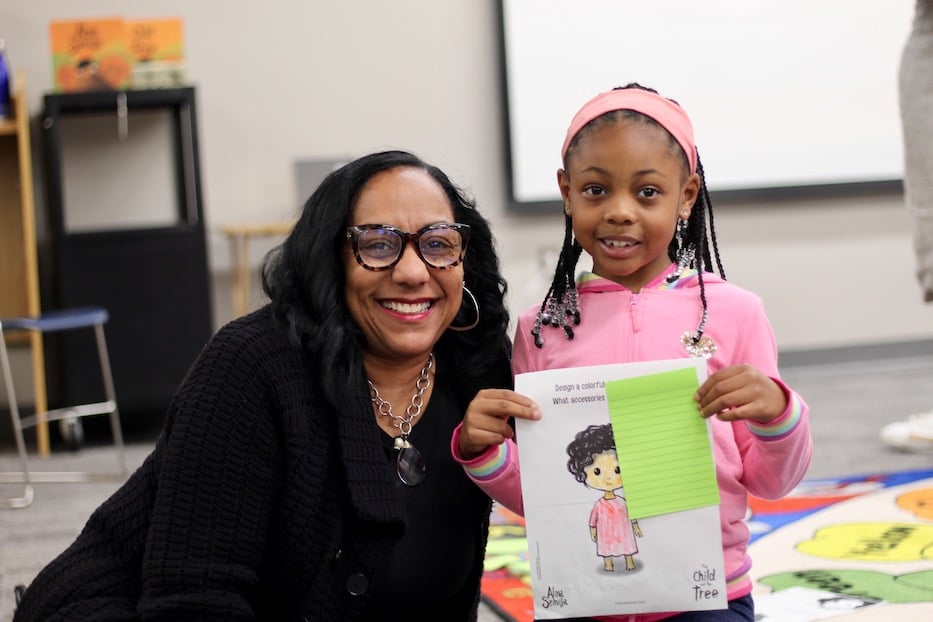
Debbie Stanley-McAulay and her granddaughter, Eva.
She turned the page, and suddenly Alma was tending to the broken tree, its cover ripped away by the wind and sand. Without a sound, five-year-old Eva McAulay and her grandmother Debbie Stanley-McAulay tiptoed into the room, and took a seat on the back of the rug. Eva looked at the tree with soft, wide eyes as it slowly began to regrow, and seed pods appeared along its branches.
As if she had read Eva’s mind, Bernal looked up.
“Waiting is really hard, isn’t it?” she said as Alma rolled the seeds into mud balls, nibbling on a few as she went. As saplings began to sprout around the tree, Conner counted them one by one until he had gotten to 21 new trees. Both watched quietly as Alma bid farewell to the tree. As she and her family began their journey, she carried a sack of cloth gently in her hands.
“Now, one question,” Bernal said. “What does she have in her hands?”
“The seeds from the tree!” answered Molly Elicker from the front of the rug.
“Do you think she is going to plant them or eat them?” Bernal asked. A smile teased at the edges of her mouth. In the book, Bernal notes that the seeds are also food for Alma, a nod to the many functions any single tree serves.
“Plant some and eat some!” piped up April Elicker from one corner of the rug.
“Imagine They Are All Gone”
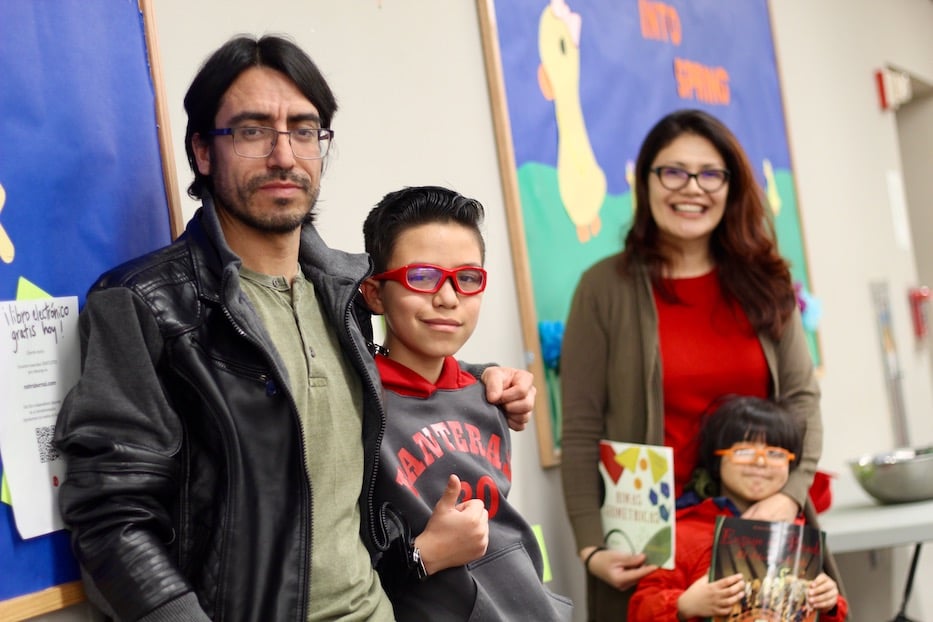
Daniel Castillo, Dante Castillo Luna, Eva Luna, and Milan Castillo Luna.
It was an introduction to a morning that was all about both protecting the earth and recognizing its aliveness. Before Bernal read the book in Spanish, Rodríguez Ferreira crouched down onto the ground, and began walking attendees through drawing Alma.
First came her big eyes, and a pile of wild, thick curls atop her head. He sketched out her body, then paused to look over young artists’ drawings. In their corner, Dante and Milan drew Alma’s body in blue, with straight brown hair and smiling eyes.
A few feet from them, Molly opted for a thick purple marker, giving her Alma short hair and a wide smile. Beside her, April went with a cool, chlorine-colored turquoise.
“And then, the most important part with art!” Rodríguez Ferreira said, lifting his charcoal with a flourish. “You have to sign your work.”
After reading the book in Spanish, Bernal had attendees close their eyes as she prepared to hand out slips of green paper. She had attendees envision the trees in their homes, yards, neighborhoods. She praised the city’s parks, which have become reflective spaces for her.
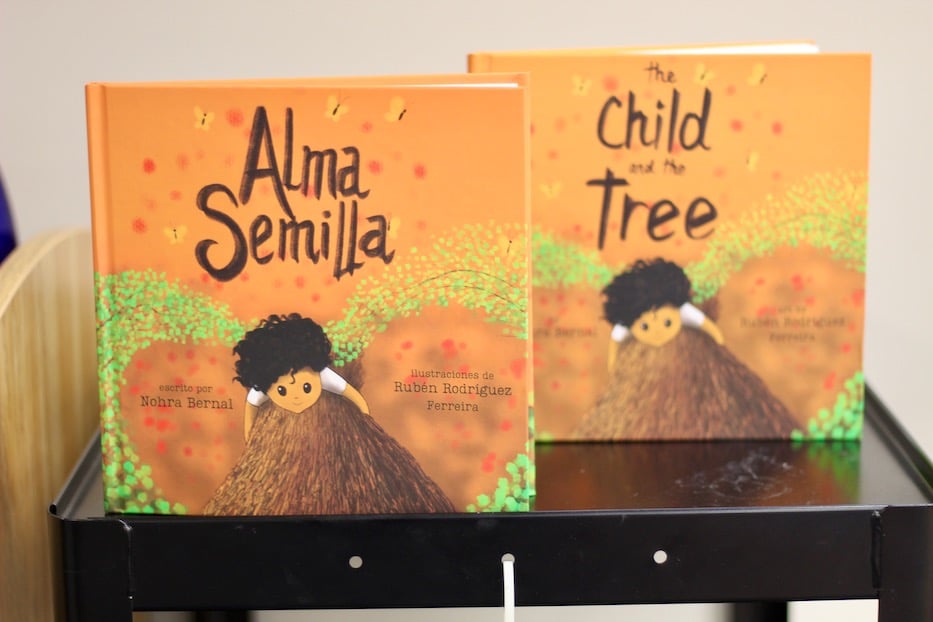
“Now, imagine they are all gone,” she said. On a wall to her left, the image of a bare, construction paper trunk waited for its leaves to grow back. “Was it nice, that place without trees? What was it like without trees? What do trees give us?”
“We couldn’t breathe without trees,” ventured Molly.
“It would be very sad to wake up without birds singing,” Rodríguez Ferreira added.
From where she sat, Eva started making a list of what she would miss if trees were gone. Fire, she scribbled down. Then paper, like the sheet she was writing on. Then sweet and nourishing fruit, like the apples she joyfully crunched down on often, and animals like birds and squirrels, which turn any backyard into a mid-morning symphony.
“But sometimes, we have to fix them,” she said, noting that trees sometimes grow sick or weak. Stanley-McAulay, who had been watching quietly, reminded her that the two recently gathered fall leaves and pinecones when they were decorating the family’s home for Thanksgiving dinner. It made the centerpieces come alive.
Nearby, Dante Castillo Luna contemplated a budding construction paper tree on the wall, where words and phrases including I Can Climb Them!, Oxígeno, and Fruit appeared beside the image of a crisp, ripe apple. After moving to New Haven from Mexico City a year and a half ago, he said, he was excited to express his love for trees in two languages.
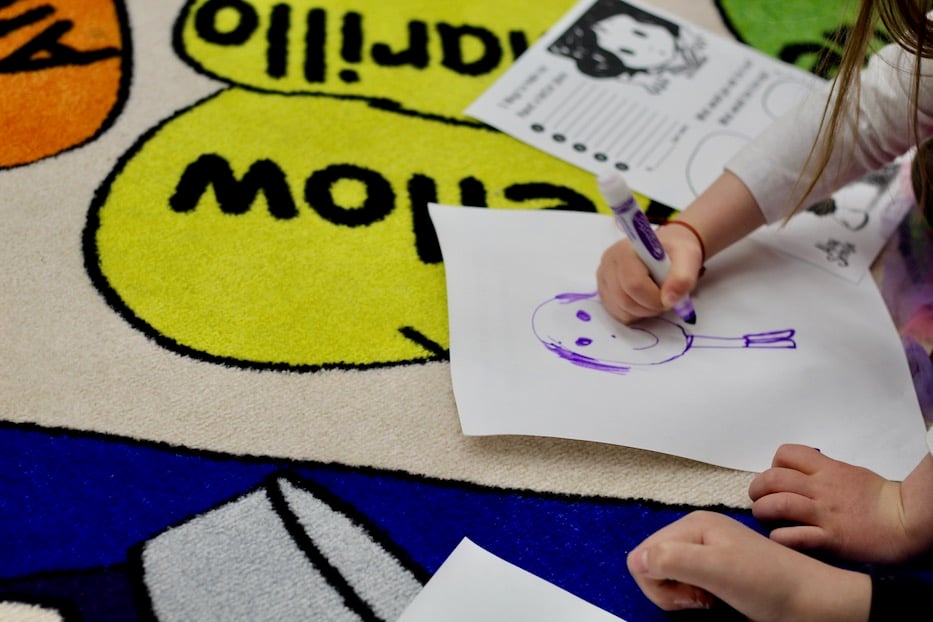
“I love them!” he said, smiling as trees entered the conversation. “They help us in so many ways and with so many things. With oxygen, with materials … nothing that we have today would have been possible without trees.”
He added that the jungle—which without trees would not exist—is currently his favorite kind of ecosystem. As a fan of animals, he also understands the relationship between the survival of wildlife and the trees in which they find home.
Nearby, New Haven Free Public Library (NHFPL) Deputy Director Luis Chavez-Brumell said he was so excited and grateful to see the event unfold at the Fair Haven Branch. As a kid, Chavez-Brumell grew up reading bilingual books, and knows the value of being able to weave between English and Spanish when working with families at the library.
Currently, it is part of an effort to bring more Spanish-language programming to the branch, including a “Migrant Mothers” group and a business incubator taught entirely in Spanish.
“It’s great to see programs like this continue,” Chavez-Brumell said. “It’s a community resource and a public good.”
Healing Through Story
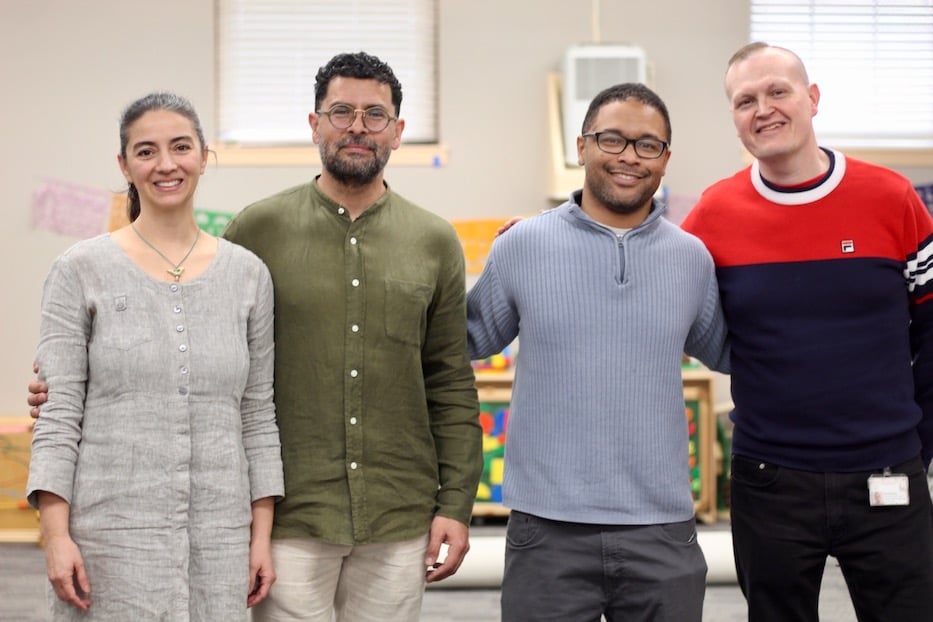
Nohra Bernal and Rubén Rodríguez Ferreira, NHFPL Deputy Director Luis Chavez-Brumell, Fair Haven Branch Manager Kirk Morrison. Lucy Gellman Photos.
For both Bernal and Rodríguez Ferreira, who hail from Colombia, The Child and the Tree is also part of a long healing process. Like their brave, curly-haired and barefoot character, the two, along with their three children, have been journeying in many places, for many years. While they now live in New Haven’s East Shore neighborhood, it has taken decades to get there.
When Rodríguez Ferreira and Bernal were first married, they moved from Colombia to France. Then a few years later, they moved from France back to Colombia, "beginning from scratch, everything," said Rodríguez Ferreira. In 2009, when their three sons were young, they left Colombia for New Haven, where Rodríguez Ferreira attended the Yale School of Music for his graduate studies in trombone. He stayed to lead the Music In Schools initiative, which he still helms today.
"Everything is so different, so new,” Bernal said. “You have to figure out every single thing. Where to buy this. How to get that. How to get there.”
Alma was constantly evolving during that time—they just didn’t realize it immediately (both now jokingly refer to her as their fourth child and only daughter). At home, the two had three young boys to care for, and were trying to navigate a new life in a new city. Both remembered how hard it was to find their footing in this new home.
"This book took so many years because it began to unravel a series of experiences, thoughts, layers, that we didn't have the time to process at the time those things happened,” Rodríguez Ferreira said. “We got to a point that we began to process, and we began to heal through the creation of this story."
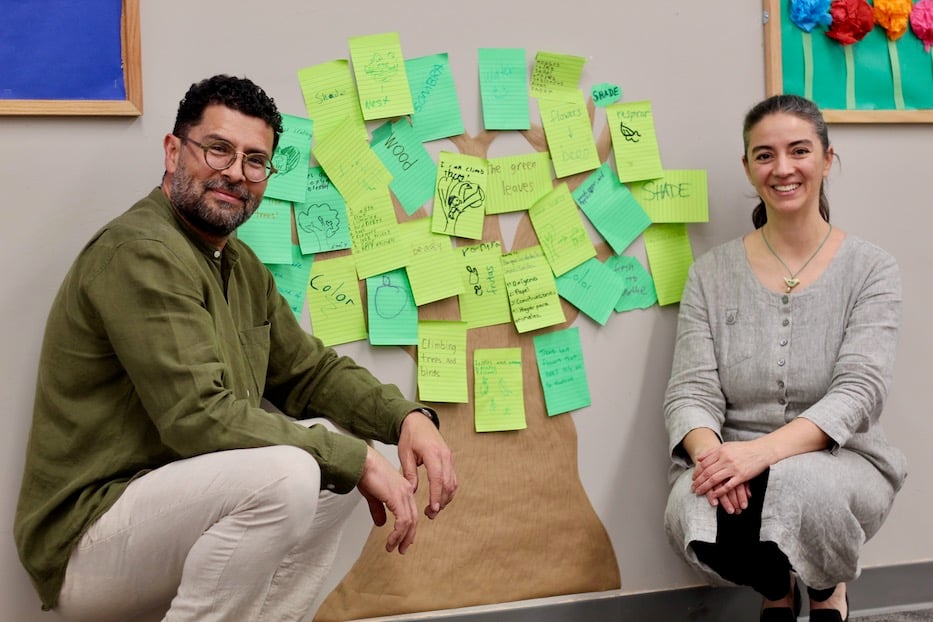
Influences from across the globe now fill its pages. Years ago, Bernal started thinking about Alma Semilla after a conversation with one of her son’s young friends, who declared that she simply found Shel Silverstein’s book The Giving Tree “unsatisfying.” The word stuck with Bernal, who started to wonder what made any given story satisfying or not.
“And I wondered, what were the elements that brought her to that conclusion?'" she remembered. She began thinking of how to build a better version of the story, complete with a relationship built on trust and care for the natural world. She had the same reaction when she returned to The Lorax years later, and realized how prescient Dr. Seuss had been.
In the years since, her inspirations have multiplied. As an immigrant, Bernal has drawn from the stories of other immigrants and refugees, including Apo W. Bazidi’s film Resistance is Life, and her own time volunteering with Afghan mothers and children through Integrated Refugee and Immigrant Resettlement (IRIS). She has looked to poetry, particularly the work of June Jordan, to religion, particularly the Jewish notion of Tikkun Olam or repairing the world, and to horticulture and back to children’s literature.
Meanwhile, Rodríguez Ferreira has leaned on a lifelong dream to be an artist, paired with a story he knew he wanted to tell. Alma Semilla is not his first foray into illustration; he has also worked on Band Rehearsal: The Elephant in the Room and Together.
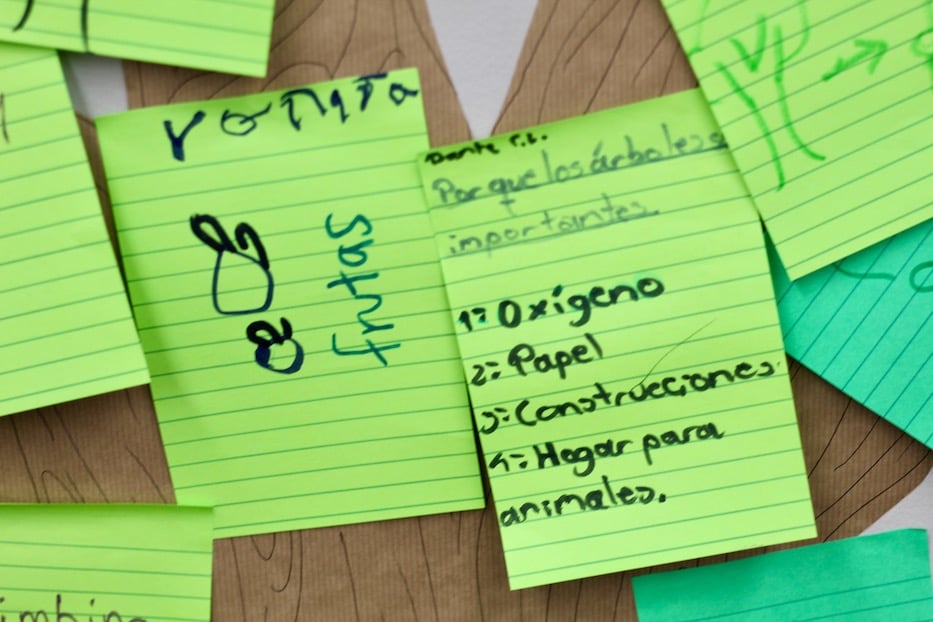
"The book describes a little bit that simple life, where resources are not abundant, but there is always that possibility of building a lot from whatever you have at hand,” he said. “And it is more an attitude of exploring a hopeful exploration, a journey of faith, using whatever life throws at you to build. To make it better."
Now that The Child and the Tree is out in the world, both Bernal and Rodríguez Ferreira said they are excited to share the work and hopeful that readers of all ages can learn from the story. When Bernal started doing read-aloud sessions at the library, she noticed that some mothers were hesitant to read to their children. It’s part of what keeps her coming back, and doing the work that she does.
“I am excited. We have been waiting for this day to come for many years,” Rodríguez Ferreira said, adding that they are already working on five other projects.” This is the culmination of a whole process of conversations, discussions, challenges, learnings, pauses, patience, and hard work.”
“It’s kind of like having a baby,” Bernal added with a laugh. “You know that once the baby’s born, the hard work begins. And it’s spreading the word. Giving the book a long life and a good life.”
To listen to the full interview with author Nohra Bernal or download the interview above. For more books from Bernal and Rodríguez Ferreira, click here and here.

